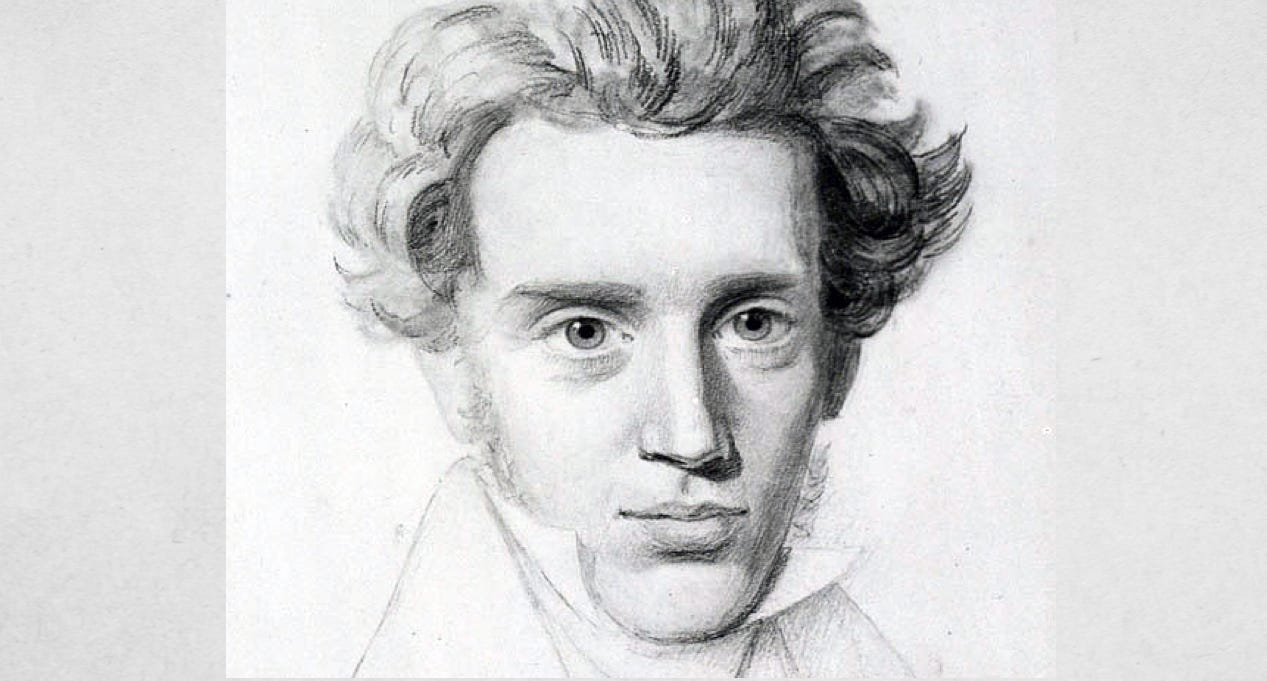Kierkegaard: In Search Of Self-Knowledge
Hey friends,
Welcome to this weeks bonus thinker. This one won’t be emailed, and will live on the Substack website feature instead. Enjoy!
Søren Kierkegaard was an anxiety-ridden Danish philosopher who wants us to give up our sentimental illusions of modern life. His willingness to really explore and experience the human condition led to a hatred of the establishment and the philosophies of his time.
Immensely influenced by the ironist and father of philosophy, Socrates, he continually questioned beliefs and ways of living. He gave the human condition a name - angst. Angst is the condition of understanding how many choices we face and how little understanding we can ever have of how to exercise these choices wisely.
“Life can only be understood backwards and must be lived forwards”
Kierkegaard is widely regarded as the first existentialist even though the word never came about until after his death. It is easy to see why. His dramatic and melancholy writing reminds us of the situation that humans are in. We have been thrown into a world with no guidance on what to do or how we should feel.
Aesthetic
Kierkegaard described three stages of life. The first is aesthetic. This is where we are obeying the dictates of pleasure and pain. We are just trying to make ourselves happy. We save money to buy something and it makes us happy.
This is true for most of us and especially true when we are young. We go travelling and buy things that will make us happy. We try and make money so that in the future we can buy a house and provide for our family so we can be comfortable and happy. We even save up money for our retirement so that our future be happy.
But, for Kierkegaard there is more to life. Life’s pleasures quickly lose their charm and we look for new ones. It’s not actually the allure of different pleasures but the whole game of chasing after the next and always finding a new one.
Ethical
While an ethical and aesthetic life do not always conflict a subtle shift has occurred. At some point in our lives, we start to value being a good person over being a happy person. The ethical person considers the effect his or her actions will have on others and gives more weight to promoting social welfare than to achieving personal gain.
An ethical person doesn’t simply enjoy things because they’re novel but makes ethical choices because those choices evoke a higher set of principles.
Kierkegaard uses marriage as an example of an ethical life choice. In marriage, the excitement of passion can quickly fade, leading to boredom and a diminishing of aesthetic pleasure.
Still, the ethical life does little to nurture one’s spiritual self. The ethical life diverts one from self-exploration since it requires an individual to follow a set of socially accepted norms and regulations.
Religious
Kierkegaard considers the religious life to be the highest plane of existence. He also believes that almost no one lives a truly religious life. For Kierkegaard, a truly religious life means battling with the absurdity of the world.
We feel boredom, anxiety, despair and angst because of the way the world is. These being mere emotions that can be changed by minor influences like whether we have eaten or had a good nights sleep. There is no guidance that tells us how to act or what to do in our lives. There is no justice and bad people get away with crimes all the time.
Kierkegaard thinks that the last stage of human life is to have faith in God despite all of the absurdity in life. He is not suggesting that you know or prove the existence of God. He is asking us to accept the absurdity of our situation and then make a ‘leap of faith’ anyway.
Even if we do not decide to believe in God, Kierkegaard’s three stages provide us with a way to reflect on our own lives and examine the way we are living. We can turn to Kierkegaard when the world has let us down badly and when we are in need of someone who can understand.
Kierkegaard’s philosophy reminds us that we are not alone.




